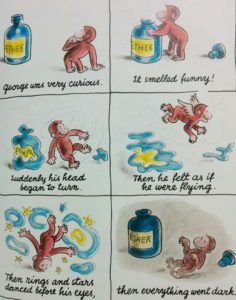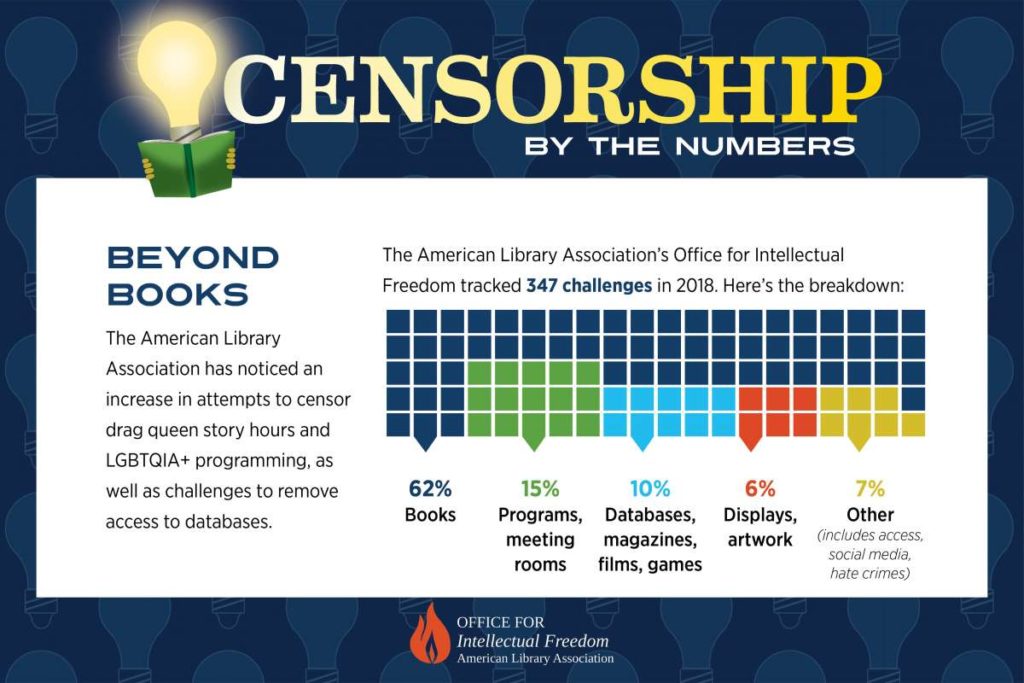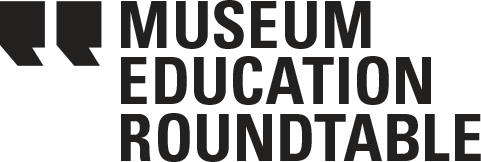MER Talks: This Blog Post Might be Banned

In June 2019, the Wisconsin Maritime Museum celebrated Pride Month for the first time. In the small northeastern Wisconsin town of Manitowoc, we flew a rainbow flag outside of the Museum. We added a rainbow filter to our Facebook banner image. We also celebrated with a program: Pride and Patriotism. This panel discussion featured three LGBTQ+ veterans who shared their lived experiences of being gay while in the military.
Amidst all this, the Museum experienced overwhelming support and resistance both internally and externally. The complaint calls escalated to a death threat. There were outcries to cancel the program. People asked what this had to do with our mission and told us to stay in our lane. Core program staff knew the essentialness of this program, and in advocating for equality for all people every day.
I reached out to Kristin Pekoll, Assistant Director of the American Library Association’s Office for Intellectual Freedom (OIF). She and her team help libraries fight censorship in libraries, and I hoped she would have some tools for museums. Her words of wisdom, talking points, and listening ear made all the difference and I’m happy to say the program was one of our most successful to date.
Abbie: Can you give us an overview of what the American Library Association’s Office for Intellectual Freedom does?
Kristin: Our first priority is helping educators. Every single request is different. Sometimes the request is for resources; book reviews, articles, or ALA policy statements. Sometimes they’re looking for talking points or a letter of support to their institution. Sometimes all they really need is an ear to listen. The situation is often stressful, isolating, and personal. We try to be there whenever possible.
In addition to supporting librarians, teachers, and educators during challenges to resources, programs, and services, ALA’s Office for Intellectual Freedom (OIF) tracks these challenges to analyze trends and raise awareness of the harms of censorship; like the Top Ten Most Challenged Books and Banned Books Week. We work as liaisons to the ALA member groups to facilitate their projects and initiatives and ultimately nurture thought leadership and growth in intellectual freedom experts.
Abbie: What sorts of challenges do libraries have to combat?
Kristin: Librarians and teachers often receive challenges to materials; books are the most common. The majority of challenges are to youth materials but there are also challenges to adult DVDs, magazines, and books. We’re seeing a significant increase in challenges to library programs and equal access to library meeting rooms. Less frequently but still noteable are challenges to displays, artwork, social media posts, and reading lists.
Read descriptions of recent censorship attempts around the country in the ALA Field Report 2018: Banned & Challenged Books.
Abbie: What are some reasons that programs and books are challenged or banned?

Kristin: Every single reason under the sun. Drug use, violence, sexuality, abortion, witchcraft, profanity, religious viewpoint, political viewpoint, sexual education, law enforcement, cultural insensitivity. The list is very long. We do our best to identify the primary reason but it’s important to capture the original language used by the complainant whenever possible.
One of my favorite examples was a parent who complained about the children’s book Curious George Takes a Job. Because of the sequence of images where George gets a whiff of ether, she wanted the book removed from the school library. Her exact comment was, “Curious George is a STONER!”
Abbie: For the Wisconsin Maritime Museum, you were a resource when our program was challenged in June. Can you share some advice for other cultural organizations who get public pushback?
Kristin: My first and most important piece of advice is to explore what your organization’s policies are regarding complaints. Ideally this should be done before complaints are expressed. Preparation is key. Finding your policy may depend on what type of organization is and what the governing structures or funding sources are. OIF is happy to help you find your policy and if you’re organization doesn’t have one, we have lots of resources to help you craft a policy.
My second piece of advice is to listen. We live in a fast world and people want instant gratification. There is no rule that says you have to respond immediately. Take time to listen, be thoughtful, consult with others and clarify best practices. When we listen, we are offering empathy and respect. We don’t have to agree with everything they say but by listening and treating them courtesy, we may have successfully accomplished most of what was desired; to be heard.
Abbie: What can we prepare ahead of time, or what steps can we take during program planning, that would help when there is pushback?
Kristin: Is there a procedure that should be followed in your organization? Can you prepare a brief proposal and get stakeholder input. Can you outline what your objectives are? Does the program fit within the organizations mission or strategic plan? Have other organizations hosted similar programs and what were their results? Is there a need or demand by your constituents?
Depending on your organization’s culture and the community you serve, you may want to flesh out the answer to some of these questions in case you have to defend your programs.
Also, is there support available? Touching base with the targeted demographic for their support or with professional colleagues is a successful technique when defending resources but it can also be a helpful tactic when planning in advance.
Abbie: How might that advice differ if the challenge is coming from inside the organization? For example, what if other staff or board members question a program’s relevance or appropriateness?
Kristin: We recommend that organizations follow their policy regardless of where the challenge is coming from. In fact, I would argue that it is more important to follow the policy if it’s internal as it displays transparency and respect for those we work with.
A lot of my advice is dependent on the specific policy. If a non-public organization doesn’t have a policy and the board has veto power on programs, then not much I say will change anything. But if there is an objective procedure in place for proposing programs, outlining demand, objectives, and mission alignment would be helpful for internal challenges.
On a side note, I personally hate the word “appropriate.” It invalidates anyone or anything that falls within that category and it is 100% subjective and literally holds no weight or substance. I detest its use in any policy and think less of people who use it as a reason when complaining about resources.
Abbie: Last question, and mostly because I want to raise awareness for OIF’s Banned Books Week (in September every year). What’s your favorite banned book and why?
Kristin: Picking my favorite banned book is like picking my favorite child. I have a few books that I frequently choose when asked this question. But my top choice is Whale Talk by Chris Crutcher; an incredibly emotional and hilarious experience of a biracial teenage boy in an all white community. Every single one of Chris’s books have been challenged. Mostly for profanity. Also he’s a huge intellectual freedom champion. He has a whole section of his website devoted to fighting censorship.
Abbie: Thank you for chatting with me Kristin and for continuing to do this important work. It matters to so many of us.


Kristin Pekoll is Assistant Director of the American Library Association’s Office for Intellectual Freedom (OIF). She is dedicated to promoting the right to read and providing education about intellectual freedom and the First Amendment. She is the author of “Beyond Banned Books: Defending Intellectual Freedom throughout Your Library” published by ALA Editions in 2019. Kristin shines a light on current challenges in libraries and schools and advocates for access to information through blogs, social media, and presentations. As a former public librarian, she is most passionate about supporting teachers and librarians on the front lines. You can reach her on Twitter @kpekoll or email kpekoll@ala.org.
 Abigail Diaz (she/her) is the Director of Education & Public Programs of the Wisconsin Maritime Museum and on the Board of Directors of the Museum Education Roundtable. She believes museums (and libraries!) are for everyone and works every day to make that a reality. Abbie is volunteer for ALA’s Office for Intellectual Freedom and a co-author of Services to People with Disabilities: An Interpretation of the Library Bill of Rights. You can find Abbie at @AbsLovesMuseums on Twitter.
Abigail Diaz (she/her) is the Director of Education & Public Programs of the Wisconsin Maritime Museum and on the Board of Directors of the Museum Education Roundtable. She believes museums (and libraries!) are for everyone and works every day to make that a reality. Abbie is volunteer for ALA’s Office for Intellectual Freedom and a co-author of Services to People with Disabilities: An Interpretation of the Library Bill of Rights. You can find Abbie at @AbsLovesMuseums on Twitter.

